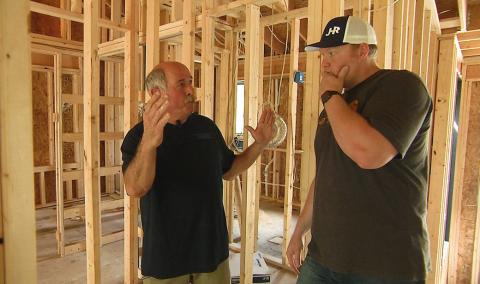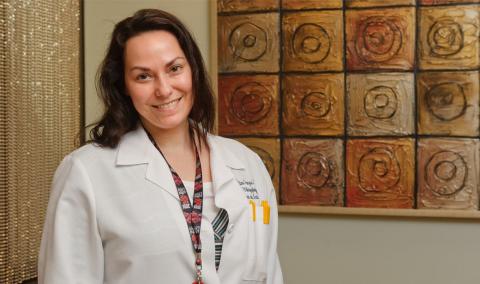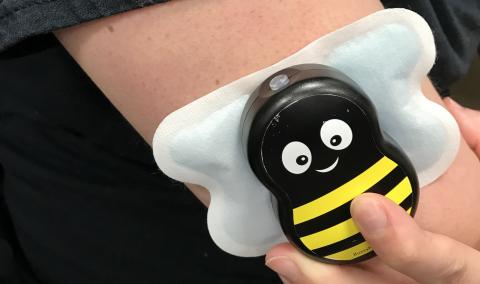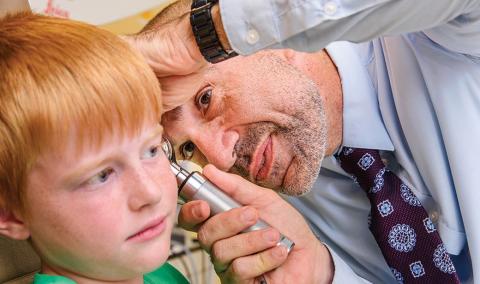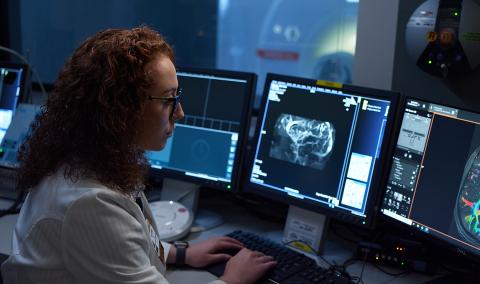The airway is one of the most important ways we interact with the world around us. If your ability to breathe, swallow or talk has been affected by an injury or medical condition, MU Health Care offers expert care to help diagnose, manage and treat your condition.
Our ear, nose and throat (ENT) specialists offer personalized treatment for voice and swallowing disorders and diseases of the voice box (larynx) and throat muscle (pharynx) so that you can find, or recover, your voice. MU Health Care’s Voice, Swallowing and Airway Center uses a team of experts, including laryngologists and speech-language pathologists. Working together with you and any existing providers, your care team will create a treatment plan that fits your personal medical history and individual goals.
If needed, you will also have access to therapy services like respiratory therapists and occupational therapists to help you regain voice, swallowing and airway function. Your care team may also refer you to other experts for diagnosis and treatment, such as gastroenterology or neurology (to help diagnose and treat conditions caused by the nervous system) to make sure you have the best outcome possible.
Conditions We Treat
Voice Conditions
Voice conditions, or dysphonia, affect the sound, volume and pitch of your voice. These conditions often cause hoarseness of the voice, and include:
- Airway narrowing (also called idiopathic subglottic stenosis)
- Difficulty swallowing (also called dysphagia)
- Diseases of the lungs, including chronic cough
- Inflamed or swollen vocal cords, usually caused by reflux or smoking
- Paradoxical vocal fold movement
- Spasmodic or muscle tension dysphonia
- Throat nodules or throat polyps
- Vocal cord dysfunction and vocal cord paralysis
- Weakness of the vocal cords in response to aging
If you experience any change in vocal tone or sound, volume, or experience pain while speaking that lasts longer than four weeks, consider making an appointment with an ENT expert or a laryngologist to evaluate you. These changes may be symptoms of throat cancer, especially if you smoke.
Swallowing Conditions
Swallowing disorders, also called dysphagia, can be caused by a variety of issues. Symptoms often include sore throat, difficulty swallowing and tonsillitis. These issues include:
- Esophageal cancer
- Esophageal dysfunction, such as Zenker’s diverticulum or cricopharyngeal dysfunction
- Esophageal narrowing, or strictures
- Esophagus problems (pharyngitis)
- Infections
- Radiation exposure to the neck
- Surgery side effects
- Trauma or injury to the neck
- Other rare neurologic issues, such as stroke, Parkinson’s disease, multiple sclerosis, amyotrophic lateral sclerosis (ALS), Alzheimer’s disease and more
Airway Conditions
Sometimes, difficulty breathing is not only caused by lung problems. The problem can be in your trachea or larynx.
- Tracheotomy. A surgical procedure in which an incision is made in your neck to bypass an obstruction in your airway and restore your breathing. We can work toward removing the tracheostomy tube together.
- Cancer of the larynx. A type of cancer that occurs in the voice box.
How We Treat Voice, Swallow and Airway Disorders
At MU Health Care, our experts offer multiple treatment options and interventions tailored to your unique condition and anatomy to help improve your swallowing. Some treatment options your care team may discuss with you include:
- Medications. Certain medicines can help relax the esophagus muscle to decrease swallowing issues.
- Dilation. During dilation, your doctor will insert a tube with a light and a balloon at the end into your throat. He or she will guide the tube into your esophagus and expand the balloon to reduce narrowing in the esophagus.
- Botox therapy. Your doctor may inject Botox into your upper esophagus to stop or slow esophagus muscles squeezing that causes some swallowing disorders.
- Laser microsurgery. Using special tools including a laser, this minimally invasive treatment can be used to remove, or resect, cancer tumors and treat other vocal and throat disorders.
- Surgery. When less invasive treatment options do not help, surgery may be your best option for restored or improved voice or swallowing function. Surgery can:
- Adjust the esophagus or other organs that are not working properly and causing voice and swallowing problems
- Reduce narrowing in the throat that leads to swallowing problems
- Remove cancerous tumors
- Remove vocal cord nodules or polyps
- Swallow therapy. We work with a specialized speech-language pathologist to evaluate your swallowing to develop an individualized plan to treat your swallowing problem.
We also offer multiple tailored interventions and surgery to help improve your voice and breathing.
- Voice therapy. A licensed speech-language pathologist (vocal therapist) will work with you to make lifestyle changes and vocal adjustments to improve hoarseness and promote healing of the vocal cords and voice box. We also have specialized voice therapists to help the professional voice user gain full use of the voice.
- Injection medialization. We can use fillers to plump up the vocal cords and help improve your voice. Some of these injections are done while patients are awake, and patients can return home within an hour after treatment.
- Implants. Vocal cord paralysis or weakness can be treated using implants, a procedure called medialization laryngoplasty, by using a mesh device to move a paralyzed vocal cord closer to the functional vocal cord, which can improve speech.
- Botox therapy. Botox can be injected into the muscles of the larynx to help relax the voice box and improve the voice.
- Surgery to widen the airway. Using specialized endoscopic laser instruments, our surgeons can widen the airway when it has been narrowed from scar tissue. Occasionally, surgery can be used to remove the narrowed segment when less invasive management options have not helped.
Why Choose MU Health Care?
At MU Health Care, our commitment to caring for a full range of voice, swallowing and airway conditions includes the only fellowship-trained laryngologist in mid-Missouri, and one of six in the state. We offer specialist care for professional voice conditions — and although our experts do care for professional musicians, many other people also use their voice professionally:
- Call center employees
- Teachers (this profession is at greatest risk of vocal cord injury)
- Coaches
- Religious leaders
- Service workers
Your care here involves a laryngologist and speech language pathologist from the beginning, and your team will work together with you to find the best treatment option for you.



